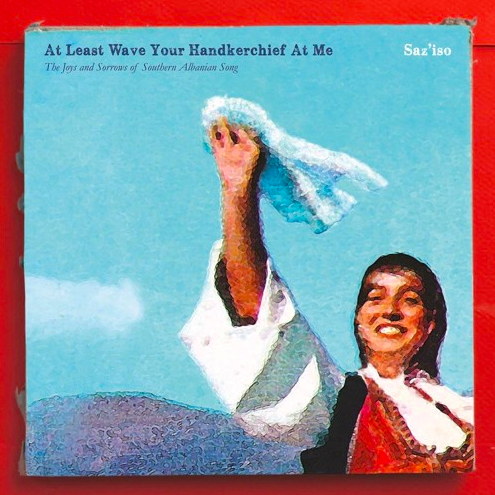With praise from Ry Cooder, engineering work by Grammy-winning Jerry Boys and a production team headed by the eminent Joe Boyd, whose credits include Nick Drake and Pink Floyd, At Least Wave Your Handkerchief At Me: The Joys and Sorrows of Southern Albanian Song comes with some heavy credentials, but those names are not what makes it so special. Like opening an exquisitely crafted jewellery box, listening to the music of Saz’iso, a collective assembled specifically for the recording of this album, is akin to dipping past an already lustrous facade to discover even more gems and riches beneath.
My previous experience of Albanian folk music was through singer-songwriter Elina Duni’s jazz-tinged interpretations of traditional songs, which deal with the country’s troubled past and the realities of a diaspora that has seen so many Albanians exiled. Working with a small jazz ensemble meant Duni’s exquisite Matanё Malit from 2012 is a sparse record, almost austere except for the singer’s beautiful voice. In comparison, the production on At Least Wave Your Handkerchief At Me abounds with melodic details that transport the listener across space and through time to Southern Albania, with singers Donika Pecallari, Adriana Thanou and Orthodox priest Robert Tralo supported by clarinets, flutes, violins and lutes in a musical form known as saze. Evolving out of a cappella singing, the voices blend with the instruments in perfect harmony, a style called iso-polyphony. The two women singers, both forced to live for decades in Greece in the aftermath of the reign of communist dictator Enver Hoxha, have neatly contrasting but complementary voices, one high and mournful, the other resonant and warm. They sing in tandem or trade lines, their voices wrapped around each other as much in conversation as in song, before retreating to leave space for the instruments to shine. The addition of Robert Tralo on some songs further broadens the tonal range.
The songs in question are treasures of Southern Albanian culture, one where east and west met during the advance of the Ottoman empire. There’s a distinct Middle Eastern lilt to some of the clarinet playing, while the languid violin drones are more redolent of Western European folk, creating a heady and atmospheric mix. It’s no surprise to learn that violinist Aurel Qirjo has performed in both Turkish and Greek ensemble in addition to saze. The songs’ lyrics deal with similar themes to those explored by Duni’s: partisans fighting foreign invaders and the realities of diaspora, but also love, joy and sorrow. Some pieces, like the instrumental ‘Valle Minushi’, are propelled by uplifting melodies and would have been performed at weddings. In comparison, ‘Nënockë’ is a heartrendingly mournful lament, with Pecallari and Thanou’s voices meshed together in despair. ‘Penxherenë e zotrisë sate’ is built on a swirl of ominous lutes and a whirling violin line, as a lovelorn boy yearns for an unattainable woman. It’s an almost epic song in scope, the voices dipping and rising like crests of a wave, stretching heavenwards in an aching finale.
At Least Wave Your Handkerchief At Me is a treasure trove for anyone looking to delve deep into the mysterious, hypnotic and rich folklore of Southern Albania, a region too often ignored by or unknown to non-Albanians. To listen to it is to be wrenched into a world that at times possibly seems lost, guided by singers driven as much by experience and empathy as by a desire to sing. This album is musical preservation unfurling before your ears.


